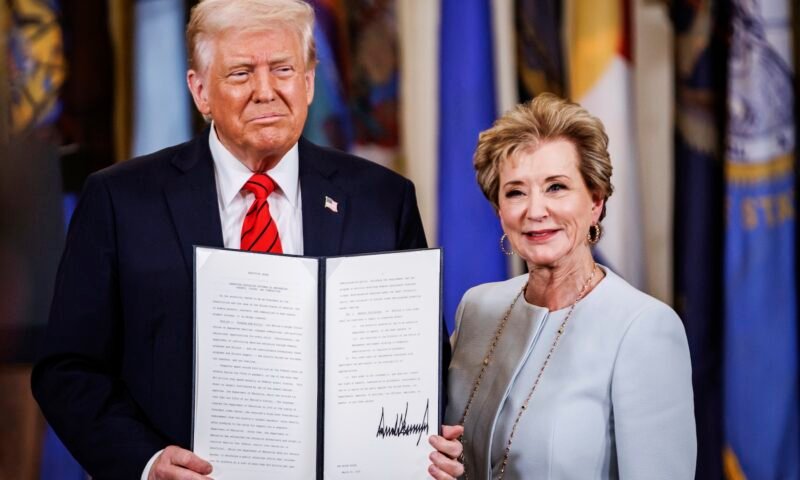

Key points
- Twenty-one states and the District of Columbia have sued the U.S. Department of Education, claiming that the new PSLF rule illegally allows the department to deny student loan forgiveness eligibility to employers it does not favor.
- The coalition says the rule is “weaponizing” the student loan system by labeling public and nonprofit employers as having a “substantial illegal purpose.”
- The suit says the rule violates the Higher Education Act and the First Amendment, and seeks to stop it before its effective date of July 2026.
A coalition of 21 Democratic-led states and the District of Columbia filed a lawsuit Monday in federal court to block a controversial new rule that would redefine who qualifies for the Public Service Loan Forgiveness (PSLF) program. This comes shortly after a group of cities and nonprofits also filed a lawsuit for the same reasons.
The complaint is Commonwealth of Massachusetts et al. v. U.S. Department of Education and Linda McMahon (PDF file). The states claim the Trump administration exceeded its legal authority and politicized a long-standing bipartisan program that provides student loan debt relief for government and nonprofit workers.
Would you like to save this?
What the new PSLF rule will do
The final rule, published on October 31, 2025, and scheduled to take effect on July 1, 2026, gives the Secretary of Education the authority to disqualify any government or nonprofit employer deemed to have a job. “Major illegal target.”This came based on an executive order signed by President Trump last March.
The section cites several examples, including:
- Assistance with violations of federal immigration law
- Providing gender-affirming medical care
- Engaging in “unlawful discrimination”
- Supporting “public disorder” or “political violence.”
Critics point out that these categories closely track issues that the administration has targeted in other policies. “The only forms of ‘illegality’ mentioned are a carefully selected list of groups and activities most favorable to this administration, including immigrant support, gender affirming sponsorship, diversity, equality, inclusion initiatives, and political protest,” the complaint states.
By giving the Department of Education discretion to interpret these terms, the states say, the rule effectively allows the federal government to strip PSLF eligibility from entire sectors (such as sanctuary states, immigrant rights nonprofits, or universities with DEI programs) based solely on policy disagreements.
Legal argument
The 47-page complaint, filed by attorneys general from Massachusetts, New York, California, Colorado, Illinois, Maryland, Washington and 15 other jurisdictions, relies on two main allegations:
- Legal violation -The rule conflicts with the Higher Education Act, which clearly defines PSLF eligibility to include “full-time employment in the government” or at a tax-exempt 501(c)(3) nonprofit organization. Congress provided no exceptions for employers engaging in “unlawful” activity or for unfavorable viewpoints.
- Violation of the Administrative Procedure Act – The rule is “arbitrary and capricious,” and gives the Department of Education “virtually unlimited discretion” to determine which employers are not eligible. The complaint indicates that this term ‘High illegal target’ It does not appear anywhere in the PSLF statute and lacks any clear standards for notification or appeal.
The filing adds a constitutional claim as well, asserting that the rule is being violated First Amendment Protection by penalizing public sector employers and nonprofits for their speech and advocacy.
How PSLF works and why this is important
Created in 2007 with bipartisan support, the PSLF program allows borrowers who make 120 monthly payments while working full-time for a qualifying government or nonprofit employer to have their remaining federal student loan balance forgiven.
The program has Exemption of more than $85 billion for more than one million borrowersincluding teachers, firefighters, social workers and nurses. Many states rely on PSLF as a recruiting tool for hard-to-fill public positions.
Plaintiffs argue that the new rule threatens that foundation. If a state or city government is deemed to have an “unlawful purpose”—for example, providing protection for immigrants or funding public health programs that include gender-affirming care—then its employees could lose PSLF eligibility. Borrowers who have spent years making qualifying payments may have to start over or forego forgiveness altogether.
Where it’s particularly challenging is with large employers like the city of Los Angeles — who may have schools, a hospital, firefighters and police officers, all employees of the city. If one area is found to have an “illegal purpose,” all employees may lose.
What will happen next?
The multi-state coalition is asking the court to annul the rule, declare it illegal, and prevent the ministry from implementing it. States are also seeking declaratory relief asserting that higher education law leaves no room for the “unlawful purpose” test.
The Department of Education has not yet provided a response, but officials are expected to say the rule falls within the agency’s authority to ensure the safety of the program.
Since the rule will not take effect until July 2026, courts will likely hear requests for preliminary injunctions in the next few months (after the government shutdown ends), setting up one of the most critical legal tests of federal student loan policy since the Supreme Court struck down the 2023 debt cancellation plan.
Don’t miss these other stories:
Cities sue over PSLF employer rule change
Can the federal government privatize student loans?
Can President Trump reverse student loan forgiveness?
Editor: Colin Greaves
The post 21 states sue Trump administration over new PSLF rule appeared first on The College Investor.




